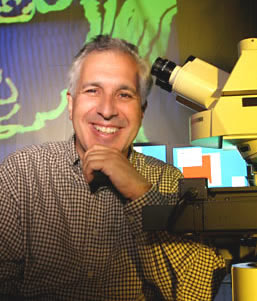Dr. Jeff W. Lichtman
Jeff W. Lichtman, M.D., Ph.D. is Professor of Molecular and Cellular Biology at Harvard University.
Jeff is interested in the mechanics that underlie synaptic competition between neurons that innervate the same target cell. Such competitive interactions are responsible for sharpening the patterns of neural connections during development and may also be important in learning and memory formation. His laboratory studies synaptic competition by visualizing synaptic rearrangements directly in living animal using modern optical imaging techniques.
He has concentrated on neuromuscular junctions in a very accessible neck muscle in mice where new transgenic animals and other labeling strategies allow individual nerve terminals and postsynaptic specializations to be monitored over hours or months. In addition, his lab has developed several new methods to improve their ability to resolve synaptic structure.
Jeff coauthored Principles of Neural Development, Development of the Vertebrate Neuromuscular Junction, Imaging Neuronal Subsets in Transgenic Mice Expressing Multiple Spectral Variants of GFP, Can molecules explain long-term potentiation?, Visualization of Neuromuscular Junctions over Periods of Several Months in Living Mice, Transgenic Strategies for Combinatorial Expression of Fluorescent Proteins in the nervous system, and In viva Observations of Pre- and Postsynaptic Changes during the Transition from Multiple to Single Innervation at Developing Neuromuscular Junctions. Read the full list of his publications!
Jeff earned his BA from Bowdoin in 1973, and earned his M.D. and Ph.D. from Washington University in 1980 where he worked until 2004, most recently as Professor of Neurobiology. In 2004 he moved to Harvard where he is a Professor in the Department of Molecular and Cellular Biology. He is also a member of the newly established Center for Brain Science.
Read Exercise and Caloric Restriction Rejuvenate Synapses in Lab Mice, Multiple Fluorescent Proteins Blend In Fantastic Images Of Neurons, and Diverse ‘Connectomes’ Hint At Genes’ Limits In Nervous System.
